
Perspectives-Studies in Translation Theory and Practice
Scope & Guideline
Advancing Insights in Cultural and Linguistic Studies
Introduction
Aims and Scopes
- Interdisciplinary Approaches to Translation:
The journal emphasizes the interdisciplinary nature of translation studies, exploring intersections with fields such as cultural studies, linguistics, law, and political science, thereby fostering a comprehensive understanding of translation phenomena. - Focus on Sociopolitical Contexts:
There is a consistent focus on the sociopolitical implications of translation, examining how translation practices and policies are influenced by and contribute to national and global politics. - Technological Impact on Translation:
The journal critically addresses the role of technology in translation, including machine translation, audiovisual translation, and digital tools, discussing their implications for translation practices and methodologies. - Cultural and Identity Dynamics:
A core area of interest is the exploration of cultural identity and representation through translation, particularly how translators navigate cultural differences and construct identities in their work. - Translation Ethics and Social Justice:
The journal also engages with ethical considerations in translation, focusing on issues of representation, equity, and the role of translation in social justice movements. - Pedagogical Innovations in Translation Training:
With a focus on education, the journal discusses innovative pedagogical approaches in translation training, addressing the evolving skill sets required in the profession.
Trending and Emerging
- Emergence of Digital and Multimedia Translation:
There is a growing body of work exploring digital and multimedia translation, including the impact of social media, online platforms, and audiovisual translation, indicating an increasing relevance of technology in translation practices. - Focus on Social Justice and Activism:
Recent publications emphasize the role of translation in social justice movements, exploring how translation can serve as a tool for activism and representation, particularly in marginalized communities. - Interdisciplinary Collaboration:
An emerging trend is the emphasis on interdisciplinary collaboration, where translation studies intersect with fields like gender studies, environmental studies, and political science, expanding the scope and impact of translation research. - Critical Examination of Translation Policies:
There is a noticeable increase in research critically examining translation policies and their implications for cultural exchange and representation, particularly in the context of globalization and migration. - Incorporation of Cognitive Approaches:
The incorporation of cognitive approaches in translation studies is gaining traction, focusing on the mental processes involved in translation and interpreting, which enhances understanding of the translator's role and challenges.
Declining or Waning
- Traditional Literary Translation Studies:
There appears to be a diminishing focus on traditional literary translation studies, particularly those that do not engage with contemporary cultural or technological contexts, as the field increasingly emphasizes more dynamic and interactive forms of translation. - Historical Translation Practices:
Research that solely focuses on historical translation practices without connecting them to current trends or implications is becoming less prevalent, reflecting a shift towards more relevance in contemporary contexts. - Static Models of Translation Theory:
The reliance on static models of translation theory, which do not incorporate the fluidity of cultural exchange and technological advancements, is waning as scholars seek more adaptable and integrative frameworks. - Monolingual Perspectives:
There is a noticeable decrease in studies that focus exclusively on monolingual perspectives in translation, as the field increasingly recognizes the importance of multilingual and cross-cultural dynamics. - Narrowly Defined Genres:
Research focusing on narrowly defined genres of translation, such as specific literary forms without broader contextual relevance, is less frequently published, indicating a shift towards more inclusive and expansive studies.
Similar Journals

Jordan Journal of Modern Languages & Literature
Fostering Insightful Dialogue in the HumanitiesJordan Journal of Modern Languages & Literature is a prestigious academic journal published by Yarmouk University, Deanship of Research & Graduate Studies. This journal serves as a vital platform for scholars and researchers in the fields of linguistics and literature, offering a well-rounded examination of modern languages and literary theory. With an impressive Q2 ranking in Linguistics and Language and a Q1 distinction in Literature and Literary Theory as of 2023, it consistently features high-quality research that contributes to the advancement of knowledge in these domains. The Scopus rankings further reflect its academic rigor, placing it in the 79th percentile for Literature and Literary Theory and maintaining significant influence in related fields, making it an essential resource for researchers, professionals, and students alike. Although it does not operate under an open-access model, the journal's commitment to publishing groundbreaking studies can significantly aid in the understanding and progression of modern linguistic and literary practices. The Jordan Journal of Modern Languages & Literature continues to be an influential voice in fostering scholarly dialogue and advancing research in the humanities.
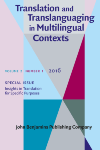
Translation and Translanguaging in Multilingual Contexts
Exploring the Nexus of Translation and MultilingualismTranslation and Translanguaging in Multilingual Contexts, published by John Benjamins Publishing Co, is an esteemed academic journal that delves into the intricate relationships between translation practices and translanguaging in diverse linguistic settings. With its ISSN 2352-1805 and E-ISSN 2352-1813, this journal provides a platform for innovative research from 2019 to 2024, focusing on areas that intersect education, linguistics, and literary theory. Notably, it holds prestigious rankings, reflecting its impact and quality; it is classified in Q2 in Education, and Q1 in both Linguistics and Language, and Literature and Literary Theory for 2023. With Scopus rankings that place it in the top deciles of multiple categories, it serves as a vital resource for scholars aiming to explore multilingual communication's challenges and opportunities. Although it operates on a traditional access model, the journal remains a critical reference point for the exchange of ideas that shapes current research in these dynamic fields.
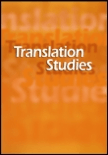
Translation Studies
Elevating Academic Discourse in LinguisticsTranslation Studies is a premier journal in the field of linguistics and language, published by Routledge Journals, Taylor & Francis Ltd, and is recognized for its exceptional impact within the academic community, boasting a Q1 classification in Linguistics and Language as of 2023. With its ISSN 1478-1700 and E-ISSN 1751-2921, this journal serves as an eminent platform for disseminating groundbreaking research, theoretical advancements, and practical applications related to translation and interpreting studies. Covering a comprehensive scope, the journal publishes original research articles, critical reviews, and theoretical discussions, making significant contributions to both the arts and humanities as well as social sciences. The journal is published in the United Kingdom and has maintained a solid reputation from its inception in 2008 through to 2024. Positioned within the top ranks of Scopus in both the language and linguistics categories, it ensures visibility, making it an essential resource for scholars, practitioners, and students who wish to stay informed of the latest trends, methodologies, and discussions in translation studies.
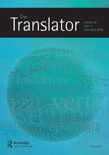
Translator
Bridging Cultures through Scholarly DiscourseTranslator is a leading journal in the fields of Communication and Linguistics, dedicated to exploring the complex dynamics of translation through critical analysis and scholarly discourse. Published by Routledge Journals, Taylor & Francis Ltd from the United Kingdom, this journal boasts a significant impact within its academic community, holding a prestigious Q1 ranking in Linguistics and Language and a Q2 ranking in Communication as of 2023. With a strong focus on interdisciplinary studies, it aims to foster an understanding of translation as both a linguistic and culturally significant practice. Researchers and practitioners alike can engage with cutting-edge research and extensive discourse, making it a valuable resource for advancing knowledge in this vital field. The journal spans a remarkable convergence of insights from 1995 to 2024, reflecting its long-standing commitment to academic excellence and innovation. Access to its resources is facilitated through various platforms, ensuring that findings are readily available to the broader academic community.
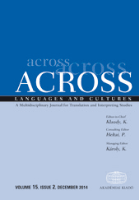
Across Languages and Cultures
Navigating the Richness of Language Across CulturesAcross Languages and Cultures is a leading journal in the field of Linguistics and Language, published by AKADEMIAI KIADO ZRT in Hungary. With its ISSN 1585-1923 and E-ISSN 1588-2519, the journal has established itself as a prominent platform for advancing research and discussion in the dynamics of language across diverse cultural contexts. Its impressive Q1 category ranking indicates its significant influence, with a Scopus rank of #227 in Language and Linguistics, showcasing its robust academic impact (79th percentile). This journal, converging from 2007 to 2024, aims to foster interdisciplinary dialogue and promote innovative research methodologies in multilingual studies. Though not an open-access journal, Across Languages and Cultures provides invaluable insights for researchers, professionals, and students eager to explore the intricacies of language use and its sociocultural implications. Located at Budafoki Ut 187-189-A-3, H-1117 Budapest, Hungary, it continues to serve as an essential resource for those passionate about the linguistic sciences.

Trans-Revista de Traductologia
Advancing the Frontiers of Translation StudiesTrans-Revista de Traductologia, an esteemed journal in the realm of Translation Studies and Linguistics, is published by the University of Malaga's Faculty of Philosophy and Letters. With an Open Access model since 2015, it facilitates the global dissemination of research and findings, supporting the academic community and enhancing visibility for scholars. The journal spans research from 2012 to 2023 and has achieved a commendable Q2 ranking in the Linguistics and Language category for 2023, signifying its growing influence within the field. Its Scopus rankings reflect its competitive edge, positioned at #484 in Arts and Humanities as well as #565 in Social Sciences, as it continues to foster a platform for innovative and interdisciplinary investigation in language dynamics, translation practices, and cultural exchanges. Scholars, professionals, and students alike will find a rich resource within its pages to explore both theoretical frameworks and practical applications in translation.
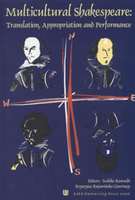
Multicultural Shakespeare-Translation Appropriation and Performance
Transforming Shakespeare: Multicultural Insights and PerformancesMulticultural Shakespeare: Translation, Appropriation and Performance is an esteemed open-access journal published by LODZ UNIV PRESS since 2011, dedicated to advancing scholarship in the fields of cultural studies, linguistics, and the performing arts. With an ISSN of 2083-8530 and an E-ISSN of 2300-7605, this journal plays a pivotal role in exploring the intersections of Shakespearean texts within diverse cultural contexts, offering fresh interpretations and performances. Hailing from Poland, it has made a noticeable impact by emerging in notable quartiles, particularly achieving Q3 rankings in both Literature and Literary Theory as well as Visual Arts and Performing Arts in 2023. The journal caters to a global audience of researchers, professionals, and students committed to enriching their understanding of multicultural perspectives on Shakespeare, embracing the nuances of translation and its relevance in today's multifaceted world. By providing an accessible platform for rigorous scholarship, this journal not only encourages academic discourse but also inspires innovative interpretations and performances that reflect our multicultural society.

Estudios de Traduccion
Fostering innovation in the art of translation.Estudios de Traduccion is a distinguished academic journal published by UNIV COMPLUTENSE MADRID, SERVICIO PUBLICACIONES, dedicated to advancing the field of translation studies. Since its establishment, the journal has embraced an Open Access model, providing researchers, professionals, and students with free and unrestricted access to high-quality scholarly articles since 2011. With the ISSN 2174-047X and E-ISSN 2254-1756, it serves as a vital resource for those interested in innovative methodologies, theoretical advancements, and practical applications within translation. By championing interdisciplinary research and fostering dialogue among scholars from diverse backgrounds, Estudios de Traduccion plays a crucial role in shaping the understanding of translation as a dynamic and evolving discipline. As a reputable platform, it invites contributions that stimulate critical thought and inspire future research in this essential area of communication.

Journal of Specialised Translation
Catalyzing Debate on Contemporary Translation ChallengesThe Journal of Specialised Translation is a leading publication dedicated to the field of translation studies, contributing to the academic discourse since its inception in 2004. Published by Roehampton University School of Arts in the United Kingdom, this Open Access journal facilitates the dissemination of high-quality research findings, making it accessible to scholars worldwide. With an impressive ranking of Q1 in Linguistics and Language and positioning in the 88th percentile across both Arts and Humanities and Social Sciences categories on Scopus, the journal commands a significant reputation in the domain. It serves as a vital platform for innovative theories, methodologies, and case studies in specialised translation, appealing to researchers, professionals, and students alike. By fostering a collaborative environment, the journal not only highlights emerging trends but also encourages rigorous debate around translation practices, ensuring that its contributions are relevant to contemporary challenges in the field.

REVISTA DE FILOLOGIA DE LA UNIVERSIDAD DE LA LAGUNA
Fostering critical discussions in linguistics and language studies.REVISTA DE FILOLOGIA DE LA UNIVERSIDAD DE LA LAGUNA is a prestigious academic journal dedicated to advancing the fields of linguistics and language studies. Published by the Universidad de la Laguna in Spain, this journal serves as an essential resource for researchers, professionals, and students alike, offering critical insights and scholarly articles that contribute to the understanding of language and its intricacies. With its inclusion in the Q3 category of the 2023 Linguistics and Language rankings and Scopus rankings, it demonstrates a growing impact within the academic community, while maintaining a commitment to fostering dialogue and disseminating valuable research. As a platform for innovative ideas and diverse perspectives, the journal aims to bridge theoretical approaches and practical applications, ensuring that readers are well-equipped to engage with contemporary issues in linguistics. Although it is currently not open access, the journal remains an influential contributor to the language and linguistics sectors, operating from the picturesque Canary Islands, enhancing its appeal not only as a scholarly resource but also as a culturally rich platform for academic expression.